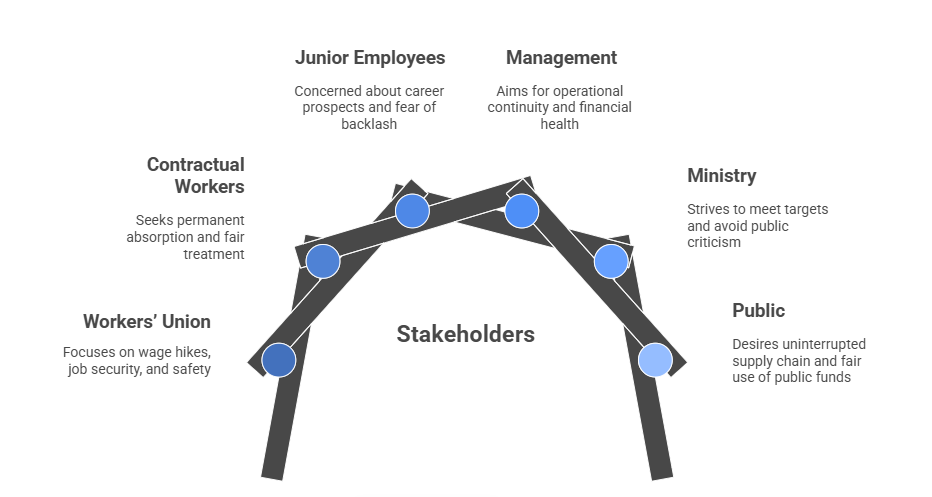- Filter By :
- Theoretical Questions
- Case Studies
-
Case Studies
Q. You are posted as the General Manager of a large public sector manufacturing unit. Recently, tensions have escalated between the management and the workers’ union. The union has raised demands regarding increased wages, better safety standards, and permanent absorption of contractual workers.
While some of their demands are legitimate and align with labour welfare norms, others may have a severe impact on the company's financial health. Moreover, you discover that a few influential union leaders are instigating workers to go on an indefinite strike, even though negotiations are still ongoing.
Meanwhile, a group of junior employees approaches you confidentially, expressing concern that the aggressive approach of the union may harm their career prospects and lead to a prolonged factory shutdown. At the same time, pressure mounts from the Ministry to avoid disruptions and meet production targets crucial for national supply chains.
In the midst of this, a senior union leader offers to de-escalate the situation in exchange for personal favors, such as awarding contracts to firms linked to him and ensuring his relatives receive preferential treatment in job promotions.
You are expected to submit a report to the Ministry suggesting a path forward that ensures industrial peace, protects workers’ rights, and prevents unethical compromises.
A. Identify and discuss the ethical issues involved in this case.
B. How would you balance worker welfare with organizational sustainability and public interest?
C. How should you respond to the offer made by the union leader? What mechanisms should be used to ensure transparency and accountability?
D. What ethical values and principles of public administration should guide your conduct?(250 words)
01 Aug, 2025 GS Paper 4 Case StudiesApproach :
- Briefly describe the situation to establish context.
- Identify and discuss the ethical issues involved in this case.
- Provide a multi-pronged ethical strategy to balance worker welfare with organizational sustainability and public interest.
- Discuss the ethical response to the Union Leader’s Offer and suggest mechanisms to ensure transparency and accountability.
- Mention the ethical values and principles of public administration that should guide your conduct.
Introduction
As the General Manager of a public sector manufacturing unit, I face a complex situation involving legitimate labour unrest over welfare demands, unethical behavior by a senior union leader, pressure from the Ministry for production continuity, and concerns from junior employees over prolonged conflict. The challenge lies in reconciling competing interests ethically while ensuring industrial harmony.
Body :
A. Ethical Issues Involved
- Conflict of Interest and Corruption: The offer of personal favors by a union leader in exchange for de-escalating protests is a case of quid pro quo, violating integrity and probity in public service.
- Fairness and Equity: Permanent absorption of contractual workers and wage revision raise questions of fairness versus financial prudence.
- Pressure from Stakeholders: Balancing conflicting expectations—from workers, junior staff, management, and the Ministry—poses pressure to ethical neutrality.
- Transparency and Trust: The aggressive tactics by union leaders undermine mutual trust, while the concerns of junior employees raise issues of voice and representation.
B. Balancing Worker Welfare with Organizational Sustainability and Public Interest
- Assess Demands Objectively:
- A three-tier evaluation of demands:
- Legitimate and feasible (e.g., improved safety standards).
- Ethically valid but financially challenging (e.g., permanent absorption of contract workers).
- Unsustainable or unfair (e.g., disproportionate wage hike demands).
- Utilize cost-benefit analysis, benchmarking with industry standards, and consultation with labour law experts.
- A three-tier evaluation of demands:
- Open and Inclusive Dialogue:
- Establish a tripartite negotiation mechanism involving the union, junior staff representatives, and management.
- Ensure that the negotiation process is recorded and minuted to maintain transparency.
- Worker Welfare with Financial Discipline:
- Explore phased implementation of feasible demands (e.g., gradual wage revisions or skill-based promotions).
- Invest in long-term welfare—training, upskilling, and better working conditions—aligned with both employee welfare and productivity.
- Protect Public Interest:
- Ensure minimum operational continuity to meet national supply commitments using voluntary workforce or alternate arrangements.
- Propose temporary MoUs or arbitration to defer strikes while negotiations continue.
C. Response to the Unethical Offer
- Immediate Rejection: Firmly refuse the offer, emphasizing adherence to ethical conduct and zero tolerance for corruption.
- Document and Report: Record the incident confidentially and report it to the internal vigilance department and the Ministry.
- Initiate Disciplinary Inquiry: Seek appropriate legal and disciplinary action against the involved union leader to uphold the rule of law.
Mechanisms for Transparency and Accountability
- Constitute a Grievance Redressal Committee with representation from all worker categories and an independent observer.
- Use external mediators or industrial tribunals for impartial settlement of complex demands.
- Mandate public disclosure of agreements, timelines, and audit trails of resource allocation.
- Deploy digital dashboards for real-time updates on negotiations and implementation progress.
D. Ethical Values and Principles to Uphold
- Integrity: Reject any personal benefit that compromises public trust.
- Impartiality: Treat all stakeholders—senior union leaders, junior staff, contract workers—with fairness.
- Accountability: Ensure decision-making is open to scrutiny by higher authorities and the public.
- Empathy and Responsiveness: Listen to the concerns of vulnerable junior employees.
- Rule of Law: Uphold labour laws, anti-corruption frameworks, and administrative ethics.
Conclusion :
As Immanuel Kant rightly said, "Act only according to that maxim whereby you can at the same time will that it should become a universal law." This principle of duty-bound ethics must guide my conduct, ensuring decisions are morally sound, universally applicable, and rooted in integrity.
To get PDF version, Please click on "Print PDF" button.
Print PDF





